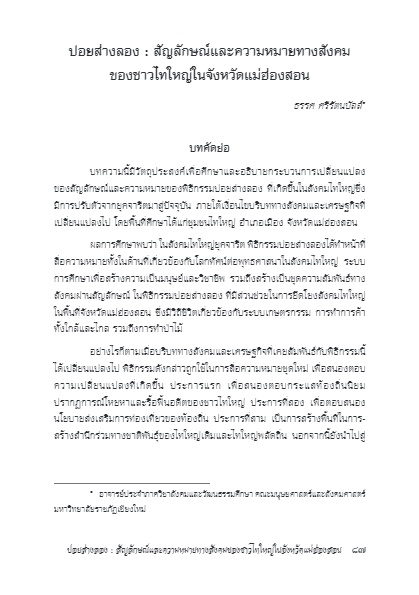ธรรศ ศรีรัตนบัลล์
บทคัดย่อ
บทความนี้มีวัตถุประสงค์เพื่อศึกษาและอธิบายกระบวนการเปลี่ยนแปลงของสัญลักษณ์และความหมายของพิธีกรรมปอยส่างลอง ที่เกิดขึ้นในสังคมไทใหญ่ซึ่งมีการปรับตัวจากยุคจารีตมาสู่ปัจจุบัน ภายใต้เงื่อนไขบริบททางสังคมและเศรษฐกิจที่เปลี่ยนแปลงไป โดยพื้นที่ศึกษาได้แก่ชุมชนไทใหญ่ อำเภอเมือง จังหวัดแม่ฮ่องสอน
ผลการศึกษาพบว่า ในสังคมไทใหญ่ยุคจารีต พิธีกรรมปอยส่างลองได้ทำหน้าที่สื่อความหมายทั้งในด้านที่เกี่ยวข้องกับโลกทัศน์ต่อพุทธศาสนาในสังคมไทใหญ่ ระบบการศึกษาเพื่อสร้างความเป็นมนุษย์และวิชาชีพ รวมถึงสร้างเป็นชุดความสัมพันธ์ทางสังคมผ่านสัญลักษณ์ ในพิธีกรรมปอยส่างลอง ที่มีส่วนช่วยในการยึดโยงสังคมไทใหญ่ในพื้นที่จังหวัดแม่ฮ่องสอน ซึ่งมีวิถีชีวิตเกี่ยวข้องกับระบบเกษตรกรรม การทำการค้าทั้งใกล้และไกล รวมถึงการทำป่าไม้
อย่างไรก็ตามเมื่อบริบททางสังคมและเศรษฐกิจที่เคยสัมพันธ์กับพิธีกรรมนี้ได้เปลี่ยนแปลงไป พิธีกรรมดังกล่าวถูกใช้ในการสื่อความหมายชุดใหม่ เพื่อสนองตอบความเปลี่ยนแปลงที่เกิดขึ้น ประการแรก เพื่อสนองตอบกระแสท้องถิ่นนิยม ปรากฏการณ์โหยหาและรื้อฟื้นอดีตของชาวไทใหญ่ ประการที่สอง เพื่อตอบสนองนโยบายส่งเสริมการท่องเที่ยวของท้องถิ่น ประการที่สาม เป็นการสร้างพื้นที่ในการสร้างสำนึกร่วมทางชาติพันธุ์ของไทใหญ่เดิมและไทใหญ่พลัดถิ่น นอกจากนี้ยังนำไปสู่การสร้างชุดความสัมพันธ์ทางสังคมในรูปแบบใหม่ที่สัมพันธ์กับสภาพสังคมและเศรษฐกิจในปัจจุบัน ดังกล่าวมาสะท้อนให้เห็นกระบวนการปรับตัวของพิธีกรรมปอยส่างลอง เพื่อให้สามารถรับใช้สังคมในช่วงเวลาที่เปลี่ยนผ่านจากโลกจารีตสู่โลกสมัยใหม่ได้เป็นอย่างดี
(ตีพิมพ์ใน วารสารไทยศึกษา ปีที่ 11 ฉบับที่ 2 (กรกฎาคม – ธันวาคม 2558) หน้า 87-112)
The Social Meanings of the Poysanglong Ceremony of the Tai Yai People in Maehongson Province
That Sriratanaban
Abstract
This article aims to analyze and explain the evolving meaning and function of the Poysanglong Ceremony in the Tai Yai community, which has undergone social and economic transitions from the traditional period up to the present day. The subject of the study is the Tai Yai community in Muang district, Maehongson Province.
The study finds that, in the traditional period, the Poysanglong Ceremony served such purposes as: signifying the Tai Yai people’s beliefs in Buddhism; providing means to education and occupational skills training for Tai Yai males; and establishing social relationships and cohesion within the Tai Yai community in Maehongson province, whose livelihood depended upon agriculture, forestry and trade.
With the evolving socio-economic environment, the meaning and function of the Poysanglong Ceremony has also undergone transformation. At the present day, the Ceremony mainly functions in the following ways: catering to the emerging trends of localism and nostalgia among the Tai Yai people; to promote local tourism; strengthening the consciousness of the ethnic identity of both the local Tai Yai people and the Tai Yai migrants; and creating new forms of social relationships which correspond to the changes in modern society.
(Published in Journal of Thai Studies Volume 11 Number 2 (July – December 2015) Page 87-112)
บทความ / Full Text : Download
